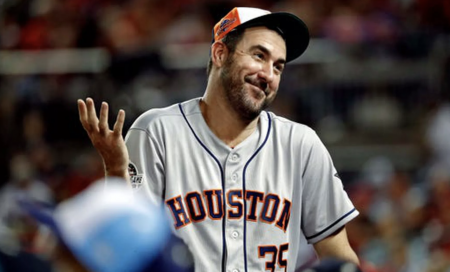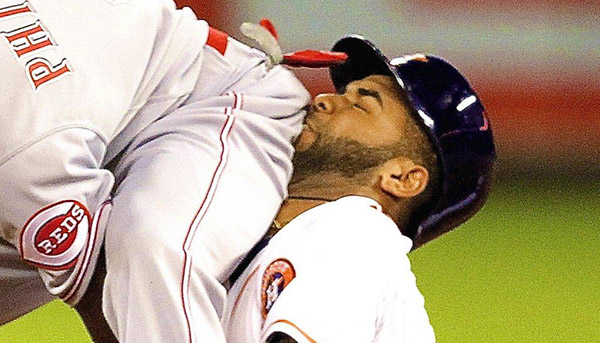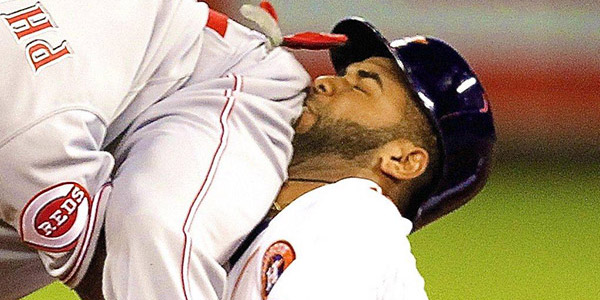Waiver Wire Waver: MLB’s New Post-Trade Deadline Craze
 Thad Levine, GM of the Minnesota Twins, offered an unusual perspective on MLB Network Radio in the last few days. He said, There will be a few players that change hands between now and the end of August that will leave some fans scratching their heads that they were available just on an outright waiver claim.
Thad Levine, GM of the Minnesota Twins, offered an unusual perspective on MLB Network Radio in the last few days. He said, There will be a few players that change hands between now and the end of August that will leave some fans scratching their heads that they were available just on an outright waiver claim.
It’s the Waiver Wire Waver
If you haven’t paid attention to the waiver moves and designate-for-assignments that have colored the first week of August, you may not have noticed how many players have been waived and subsequently claimed by other teams. This new non-revocable waiver transfer period, supposedly itself waived, is alive and well, with some critical differences. The waiver wire waver.
Teams can still acquire an overpaid player at the last minute. But not necessarily the player they want. Because they cannot offer trade pieces. So, all they can do is select from what is in the bargain bin.
And if they should find a player they like, the team claiming the player will pay that player only the prorated portion of the league minimum for any MLB time that that player spends on the team’s 25-man roster. The claiming team also assumes the player’s contract the following season and beyond.
On the other hand, the team that released the player is off the hook contractually once the player is no longer under their control. And once they finish paying the prorated portion of the major league minimum, their financial commitment is over.
The Justin Verlander Effect
So, the difference this time around is the Detroit Tigers could release Justin Verlander, but they would still own his onerous contract for the remainder of the season. Paying all of it minus the prorated portion that Houston would have paid, had it been a simple waiver transaction.
Because the Verlander transaction was a trade, not a waiver claim (even though Houston made the initial waiver claim on Verlander), Detroit sent the Astros Verlander and $16 million to cover his salary for the 2018 and 2019 seasons.
This offset Verlander’s annual $28 million salary over those two seasons. So, Detroit received three prospects and $40 million from Houston. Houston bought the World Series.
Had Detroit waived Verlander today or tomorrow or even August 31, they would not receive any of the prospects they did. Nor the cash. Because this sort of waiver deal is not allowed this year.
So, given these strictures, why would Detroit or any team release a player of Verlander’s caliber to be claimed free of charge?
Answer? They wouldn’t.
Not a player of Verlander’s stature, unless they wanted the team selecting him to assume his contract next season. Or he was such a distraction they just wanted him gone.
For those who remember, the Boston Red Sox once placed Manny Ramirez, at the peak of his offensive prowess, on waivers in August. Sportswriters assumed the Red Sox had hoped (expected?) the Yankees might claim Ramirez, his antics, his onerous contract and take him off their hands. As it was, not one team claimed Ramirez. Not even free of player cost would any team pluck Manny off waivers. Mostly because no other team would assume his bloated contract.
So? Any takers for the waiver wire waver?
Yes, Takers and Second Guessers
Kansas City claimed right-handed pitcher Jacob Barnes off waivers from Milwaukee on August 3. He was temporarily assigned to Triple-A Omaha before joining the Royals, as reports suggest.
The New York Mets, ever on the lookout for their next band-aid, claimed lefty Donnie Hart off waivers from the Baltimore Orioles. Hart will report to Triple-A Syracuse. More than likely, he will never quash any uprisings against the Mets. What he will probably do is pour gasoline on rampaging fires, as he did in Baltimore.
Even the Boston Red Sox, desperately in need of production at first base, signed ex-Phillies first baseman Tommy Joseph to a minor league contract. He will report to Triple-A Pawtucket, but whether he’ll ever help the Sox, who knows?
Of course, will utility players, left-handed relief specialists and even the odd starting pitcher be enough to affect the course of the upcoming pennant races up for grabs? The waiver wire waver will tell.
The Yankees and Dodgers may not be among teams adding these players to their rosters, but a lefty reliever, like Tony Sipp, should he pass through waivers unclaimed, could help some team needing left-handed relief. But Sipp is not Brad Hand or Felipe Vazquez, both of whom will not hit the waiver wire this August, whereas Sipp just might.
Other teams looking for defensive help in the infield could add Alcides Escobar, who was just released. While the Giants released Tyler Austin, a right-handed hitter who had mashed left-handed pitching, even with the Giants. Might he soon be a Boston Red Sox? Or a Yankee? Given their recent rash of injuries at first base, Luke Voit and Edwin Encarnacion, the Yankees might consider claiming their ex-farmhand as they do the waiver wire waver.
Ultimately, winning is about foresight, vision and perhaps even brilliance. So, for organizations that know how to evaluate player potential, who can spot a steal when they see one, there may be one or two possibilities to improve, even in August 2019, for those considering the waiver wire waver.

























